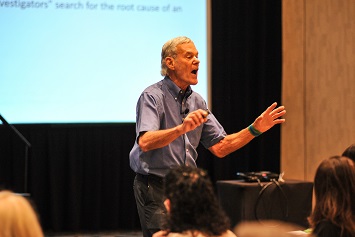At BLR’s Safety Culture 2018 conference, taking place September 13-14 in Atlanta, Dr. E. Scott Geller, a senior partner of Safety Performance Solutions and an alumni distinguished professor at Virginia Tech University, delivered an opening keynote titled Seven Life Lessons for Safety and Beyond. Dr. Geller provided attendees with some key insights from his 50-plus years of studying, teaching, and researching psychology with applications for occupational safety and beyond.

Culture is all about people, noted Dr. Geller, and to sustain safety, organizations need to foster a culture of interdependency. For many organizations, the challenge lies in convincing employees that the company actively cares about their well-being. The Seven Life Lessons Dr. Geller described strive to motivate and engage employees to pursue the behaviors that contribute to a strong culture of safety and well-being both and off the job.
Seven Life Lessons
- Employ more positive consequences. Sometimes discipline takes a leading role in enforcing safety rules in the workplace, but psychological research shows that negative consequences don’t motivate lasting behavior change. A behavior may change temporarily to avoid a negative consequence, but the change will not be sustained, and the employee is likely to perform the desired behavior only when threatened. In addition, Dr. Geller noted, negative consequences lead to failure avoidance, not success seeking, which hinders safety goals that seek to exceed compliance.
- Benefit from observational learning. Model the behavior you want to see, but be careful about the specifics and be mindful of what you’re modeling. An observer may end up noticing and imitating an unexpected, perhaps undesirable, aspect of a process.
- Improve with behavioral feedforward and feedback. “Feedforward” is an activator or motivation that comes before a behavior, whereas feedback occurs after a behavior and seeks to provide useful information to help improve and sustain performance. In order to be most effective, feedback should be sincere, specific, significant, and soon, said Dr. Geller.
- Give more supportive than corrective feedback. Although errors tend to receive more attention, Dr. Geller emphasized that supportive feedback is more effective at motivating desirable behaviors.
- Embrace and practice empathy. Empathy consists of trying to understand another person’s perspective and forming an emotional connection. Dr. Geller highlighted five levels of listening—ignoring, pretending to listen, selective listening, attentive listening, and empathic listening—and noted that although selective listening is the most common, empathic listening, which involves trying to listen from the other person’s position, is a critical component of establishing an interdependent culture of caring.
- Customize consequences for self-motivation and sustainability. Desirable behaviors can be activated through empowerment, which requires both training (instruction in how to do something) and education (instruction in why something is done). Dr. Geller shared an acronym for developing goals that are likely to produce empowerment: SMARTS, which stands for Specific, Motivational, Achievable, Relevant, Trackable, and Shared. To be effective, goals should incorporate these qualities. In addition, ongoing, sustainable behavior requires a level of self-motivation or intrinsic motivation. When people perceive that they have a choice, are competent to achieve a goal, and are part of a community, they are more likely to be self-motivated.
- Progress from self-actualization to self-transcendence. Abraham Maslow published the classic hierarchy of needs in 1943, with physiological needs at the base and self-actualization at the top of the pyramid. The basic concept is that needs lower on the pyramid must be met before the higher needs can be addressed. In his later years, however, Maslow added a new apex to the pyramid: self-transcendence. Dr. Geller emphasized the importance of self-transcendence for creating an interdependent culture of caring and tied it to his philosophy of actively caring for people in order to sustain safety and human well-being, both at work and beyond.
